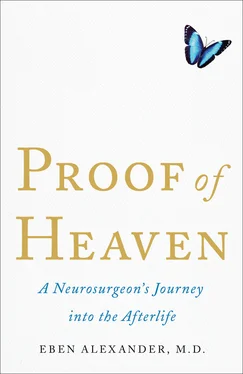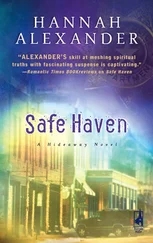Holley first met our friend Sylvia in the 1980s, when both were teaching at the Ravenscroft School in Raleigh, North Carolina. While there, Holley was also a close friend of Susan Reintjes. Susan is an intuitive—a fact that never got in the way of my feelings about her. She was, to my mind, a very special person, even if what she did was, to say the least, outside my straight-and-narrow neurosurgical view. She was also a channel and had written a book called Third Eye Open, which Holley was a big fan of. One of the spiritual healing activities Susan regularly performed involved helping coma patients to heal by contacting them psychically. On Thursday, my fourth day in coma, Sylvia had the idea that Susan should try to contact me.
Sylvia called her at home in Chapel Hill and explained what was happening with me. Would it be possible for her to “tune in” to me? Susan said yes and asked for a few details about my illness. Sylvia gave her the basics: I’d been in a coma for four days and I was in critical condition.
“That’s all I need to know,” Susan said. “I’ll try to contact him tonight.”
According to Susan’s view, a coma patient was a kind of in-between being. Neither completely here (the earthly realm) nor completely there (the spiritual realm), these patients often have a singularly mysterious atmosphere to them. This was, as I’ve mentioned, a phenomenon I’d noticed myself many times, though of course I’d never given it the supernatural credence that Susan had.
In Susan’s experience, one of the qualities that set coma patients apart was their receptivity to telepathic communication. She was confident that once she’d put herself into a meditative state, she’d soon establish contact with me.
“Communicating with a coma patient,” she later told me, “is a little like throwing a rope down a deep well. How deep the rope needs to go depends on the depth of the comatose state. When I tried to contact you, the first thing that surprised me was how deep the rope went. The farther down, the more frightened I became that you were too far away—that I wouldn’t be able to reach you because you weren’t coming back.”
After five full minutes of mentally descending via the telepathic “rope,” she felt a slight shift, like a fishing line deep down in the water getting a small but definite tug.
“I was sure it was you,” she told me later, “and I told Holley as much. I told her it wasn’t your time yet, and that your body would know what to do. I suggested that Holley keep those two thoughts in mind, and repeat them to you at your bedside.”
It was Thursday when my doctors determined that my particular strain of E. coli didn’t match the ultraresistant strain that, unaccountably, had shown up in Israel just at the time I’d been there. But the fact that it didn’t match only made my case more confounding. While it was certainly good news that I was not harboring a strain of bacteria that could wipe out a third of the country, in terms of my own, individual recovery, it just underscored what my doctors were already suspecting all too clearly: that my case was essentially without precedent.
It was also quickly moving from desperate to hopeless. The doctors simply didn’t have an answer for how I could have contracted my illness, or how I could be brought back from my coma. They were sure of only one thing: they did not know of anyone making a full recovery from bacterial meningitis after being comatose for more than a few days. We were now into day four.
The stress took its toll on everyone. Phyllis and Betsy had decided on Tuesday that any talk of the possibility of my dying would be forbidden in my presence, under the assumption that some part of me might be aware of the discussion. Early Thursday morning, Jean asked one of the nurses in the ICU room about my chances of survival. Betsy, on the other side of my bed, heard her and said: “ Please don’t have that conversation in this room.”
Jean and I had always been extremely close. We were part of the family just like our “homegrown” siblings, but the fact that we were “chosen” by mom and dad, as they put it, inevitably gave us a special bond. She had always watched out for me, and her frustration at her powerlessness over the current situation brought her close to a breaking point.
Tears came to Jean’s eyes. “I need to go home for a while,” she said.
After determining that there were plenty of people to continue my bedside vigil, all agreed that the nursing staff would probably be delighted to have one less person in my room.
Jean went back to our home, packed her bags, and drove home to Delaware that afternoon. By leaving, she gave the first real outward expression to an emotion the whole family was starting to feel: powerlessness. There are few experiences more frustrating than seeing a loved one in a comatose state. You want to help, but you can’t. You want the person to open his or her eyes, but they don’t. Families of coma patients often resort to opening the patient’s eyes themselves. It’s a way of forcing the issue—of ordering the patient to wake up. Of course it doesn’t work, and it can also further damage morale. Patients in deep coma lose the coordination of their eyes and pupils. Open the lids of a deep coma patient, and you’re likely to find one eye pointing in one direction, the other in the opposite. It’s an unnerving sight, and it added further to Holley’s pain several times that week when she pried my eyelids open and saw, in essence, the askew eyeballs of a corpse.
With Jean gone, things really started to fray. Phyllis now began to exhibit a behavior I’d also seen countless times among patients’ family members in my own practice. She started to become frustrated with my doctors.
“Why aren’t they giving us more information?” she asked Betsy, outraged. “I swear, if Eben were here, he would tell us what’s really going on.”
The fact was that my doctors were doing absolutely everything they could do for me. Phyllis, of course, knew this. But the pain and frustration of the situation were simply wearing away at my loved ones.
On Tuesday, Holley had called Dr. Jay Loeffler, my former partner in developing the stereotactic radiosurgery program at the Brigham & Women’s Hospital in Boston. Jay was then the chairman of radiation oncology at Massachusetts General Hospital, and Holley figured he’d be in as good a position as anyone to give her some answers.
As Holley described my situation, Jay assumed she must have been getting the details of my case wrong. What she was describing to him was, he knew, essentially impossible. But once Holley finally had him convinced that I really was in a coma caused by a rare case of E. coli bacterial meningitis that no one could explain the origins of, he got started calling infectious disease experts around the country. No one he spoke to had heard of a case like mine. Going over the medical literature back to 1991, he couldn’t find a single case of E. coli meningitis in an adult who hadn’t recently been through a neurosurgical procedure.
From Tuesday on, Jay called at least once a day to get an update from Phyllis or Holley and give them feedback on what his investigations had revealed. Steve Tatter, another good friend and neurosurgeon, likewise provided daily calls offering advice and comfort. But day after day, the only revelation was that my situation was the first of its kind in medical history. Spontaneous E. coli bacterial meningitis is rare in adults. Less than 1 in 10 million of the world’s population contracts it annually. And, like all varieties of gram-negative bacterial meningitis, it’s highly aggressive. So aggressive that of the people it does attack, more than 90 percent of those who initially suffer from a rapid neurologic decline, as I did, die. And that was the mortality rate when I first entered the ER. That dismal 90 percent crept toward 100 percent as the week wore on and my body failed to respond to the antibiotics. The few who survive a case as severe as mine generally require round-the-clock care for the rest of their lives. Officially, my status was “N of 1,” a term that refers to medical studies in which a single patient stands for the entire trial. There is simply no one else to whom the doctors could compare my case.
Читать дальше












